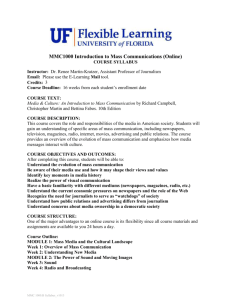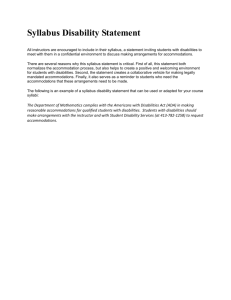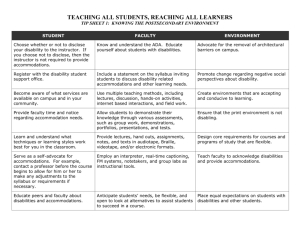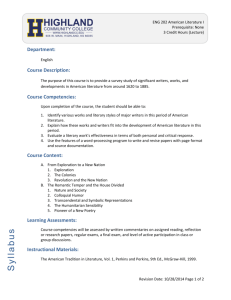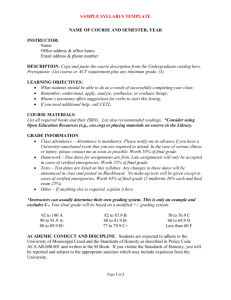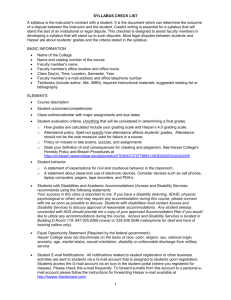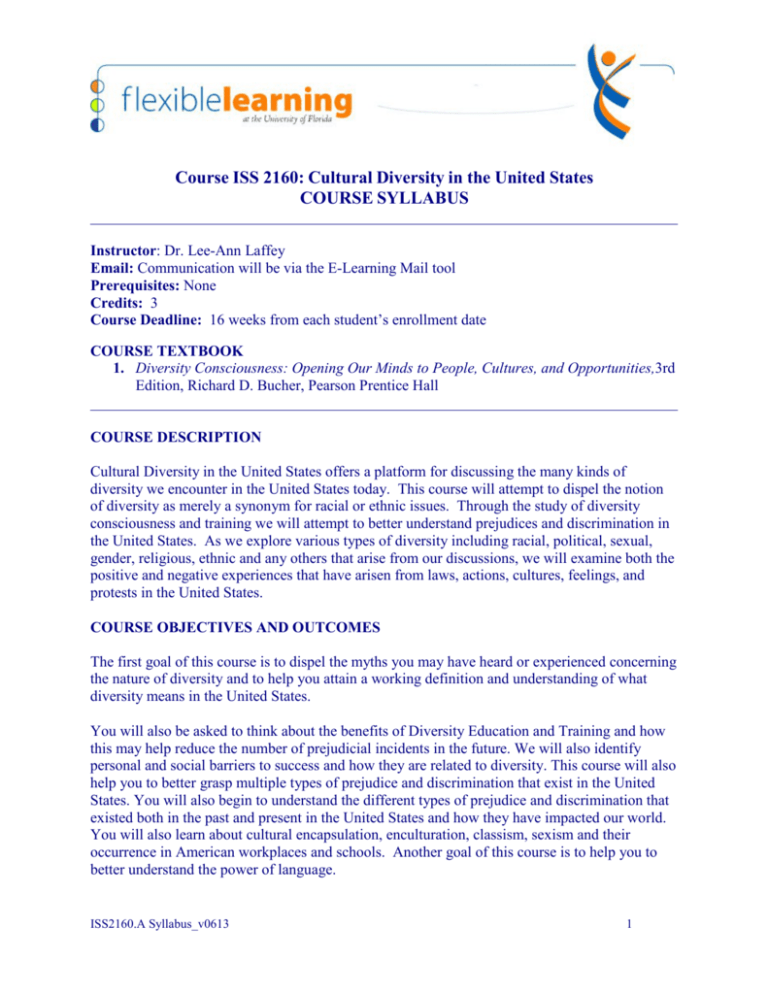
Course ISS 2160: Cultural Diversity in the United States
COURSE SYLLABUS
Instructor: Dr. Lee-Ann Laffey
Email: Communication will be via the E-Learning Mail tool
Prerequisites: None
Credits: 3
Course Deadline: 16 weeks from each student’s enrollment date
COURSE TEXTBOOK
1. Diversity Consciousness: Opening Our Minds to People, Cultures, and Opportunities,3rd
Edition, Richard D. Bucher, Pearson Prentice Hall
COURSE DESCRIPTION
Cultural Diversity in the United States offers a platform for discussing the many kinds of
diversity we encounter in the United States today. This course will attempt to dispel the notion
of diversity as merely a synonym for racial or ethnic issues. Through the study of diversity
consciousness and training we will attempt to better understand prejudices and discrimination in
the United States. As we explore various types of diversity including racial, political, sexual,
gender, religious, ethnic and any others that arise from our discussions, we will examine both the
positive and negative experiences that have arisen from laws, actions, cultures, feelings, and
protests in the United States.
COURSE OBJECTIVES AND OUTCOMES
The first goal of this course is to dispel the myths you may have heard or experienced concerning
the nature of diversity and to help you attain a working definition and understanding of what
diversity means in the United States.
You will also be asked to think about the benefits of Diversity Education and Training and how
this may help reduce the number of prejudicial incidents in the future. We will also identify
personal and social barriers to success and how they are related to diversity. This course will also
help you to better grasp multiple types of prejudice and discrimination that exist in the United
States. You will also begin to understand the different types of prejudice and discrimination that
existed both in the past and present in the United States and how they have impacted our world.
You will also learn about cultural encapsulation, enculturation, classism, sexism and their
occurrence in American workplaces and schools. Another goal of this course is to help you to
better understand the power of language.
ISS2160.A Syllabus_v0613
1
You will gain a better understanding of how communication and culture are interrelated and how
miscommunication has been the cause of more than one war. You will come to know that your
surroundings, race, religion, politics and ethnicity, as well as, many other factors can create
barriers to effective communication. In this course we will explore different types of
communication, “hot buttons” and linguistic stereotypes and how they alter our communication
in a diverse world. You will also learn about effective strategies for inclusive communication,
the value of a team based approach to leadership, as well as conflict management skills and
the ability to think critically.
COURSE STRUCTURE
Course Outline
Module 1 Overview: An Overview of Diversity
• Lesson 1: Diversity, Diversity Consciousness and Diversity Education
• Lesson 2: Our Changing Cultural Landscape
Module 2 Overview: Diversity Consciousness and the Multiple Meanings of Success
• Lesson 1: Diverse Meanings of Success
• Lesson 2: The Price of Diversity Consciousness in the Workplace
Module 3 Overview: Understanding Social and Personal Barriers to Success
• Lesson 1: Understanding Social and Personal Barriers to Success
• Lesson 2: Hate Groups
Module 4 Overview: Developing Diversity Consciousness
• Lesson 1: Defining and Developing Diversity Consciousness in the Workplace and
Education
Module 5 Overview: Communicating in a World Filled With Diversity
• Lesson 1: The Power of Language: Tools, Barriers, and Hot Buttons
Module 6 Overview: Teamwork, Leadership & Conflict Management
• Lesson1: Teamwork & Success
• Lesson 2: Leadership & Conflict Management
Module 7 Overview: Challenges to Diversity
• Conclusion – Culminating Assignment
ISS2160.A Syllabus_v0613
2
TECHNOLOGY REQUIREMENTS
Students must have and regularly check a valid email account for this course. Students are
recommended to check their email accounts at least twice per week or more often depending on
progress in the course.
By signing up for an online course, students certify that they have reliable access to a computer
and the internet. In order to take these courses, students need to have a web browser, a word
processing program, a program for reading Acrobat documents, and other programs for example
Windows or real Media to view/hear multimedia content.
If a student does not already have these programs, many options are available including these
free options:
•
•
•
Multi-platform Web Browser: Mozilla Firefox, http://www.mozilla.org/ OR
Internet Explorer, http://www.microsoft.com/windows/downloads/ie/getitnow.mspx
Word Processing: OpenOffice, http://www.openoffice.org
Acrobat Reader: Adobe Acrobat, http://www.adobe.com
ASSIGNMENT SUBMISSIONS
NOTE: If you do not have Microsoft Office or other software capable of saving documents in
one of the file formats identified above, you can download the OpenOffice software suite free of
charge at http://www.openoffice.org/product/. OpenOffice is an open-source designed office
productivity suite that has comparable components to Microsoft Office. Please reference
OpenOffice’s comprehensive help files for instructions in its effective use.
GRADING
Grading Criteria
Your course grade will be determined as follows:
1. Seven (7) Written Review Short Answer Questions - 30 points each for a total of 210
points
2. Nine (9) Internet Assignments - 30 points each for a total of 270 points.
3. Eight (8) Short Essay Assignments - 40 points each for a total of 320 points.
Total course points: 800
The course letter grade will be determined according to the following scale:
A
Excellent
720-800 points (90%-100%)
B+
700-719 points (87.5%-89.9%)
B
Good
640-699 points (80%-87.4%)
ISS2160.A Syllabus_v0613
3
C+
C
D+
D
E
Fair
Poor
Failure
620-639 points (77.5%-79.9%)
560-619 points (70%-77.4%)
540-559 points (67.5%-69.9%)
480-539 points (60%-67.4%)
479points and below
The University of Florida assures the confidentiality of all your educational records in
accordance with State University System Rules, State Statutes, and the Family Educational
Rights and Privacy Act. Grades are not given out over the phone.
Grading Standards
Here is the meaning behind the grades I assign to your papers (you should use these statements
to determine how you might work toward a higher grade):
Students will be assessed on accuracy of the factual material represented in their respective
answers, as well as, creativity and detailed descriptions where applicable. Each assignment has
a point value and specific requirements. To earn full credit the student must cover all points
asked by the question and provide adequate supporting materials, references and details. Before
answering, carefully examine what the question is asking you. If the question asks you for your
opinion be sure to include reasons, experiences and backup information. For essay type
questions or papers you need to create a well-organized paper with a beginning, middle and end.
Be sure to start with a solid introduction and thesis statement and then support it with details
and explanations that you demonstrate throughout your essay. Be sure not to be too general in
your responses and be sure to cite, quote and reference any information you obtain from other
sources.
ONLINE STUDENT CONDUCT
Students are expected to abide by the University of Florida's code of student conduct, including
the rules applicable to online courses and student conduct in general.
ACADEMIC HONESTY
Students enrolled in Flexible Learning courses through the University of Florida are expected to
perform with the highest level of academic honesty and integrity.
You are responsible for providing proper acknowledgement for any work that is not the product
of your own thought; this includes published and unpublished texts and information taken from
Internet sources. Failure to properly cite such material will be regarded as plagiarism.
Plagiarism:
“A student shall not represent as the student’s own work all or any portion of the work of another.
Plagiarism includes but is not limited to:
ISS2160.A Syllabus_v0613
4
1. Quoting oral or written materials including but not limited to those found on the internet,
whether published or unpublished, without proper attribution.
2. Submitting a document or assignment which in whole or in part is identical or substantially
identical to a document or assignment not authored by the student.” Source: Regulations of
the University of Florida, UF-4.041. For more information, please go to this link: Student
Honor Code and Student Conduct Code: Scope and Violations
“For a violation or violations of the Honor Code, a student may receive any of the sanctions that
can be imposed for Student Conduct Code violations, including but not limited to conduct
probation, suspension and expulsion as well as any educational sanctions. In addition, students
may receive the following:
(a) Assignment grade penalty. The student is assigned a grade penalty on an assignment
including but not limited to a zero.
(b) Course grade penalty. The student is assigned a grade penalty in the entire course including
but not limited to an ‘E’.” Source: Regulations of the University of Florida, UF-4.047.
Disability Accommodations:
The Disability Resource Center in the Dean of Students Office provides students and faculty with
information and support regarding accommodations for students with disabilities. Staff at the
Disability Resource Center will assist any student who registers as having a disability. Official
documentation of a disability is required to determine eligibility for appropriate accommodations.
The professional employees at the Disability Resource Program serve as full-time advocates for
students with disabilities ensuring students have physical and programmatic access to all college
programs. One of the services provided by the Disability Resource Center includes:
•
Testing Accommodations
Please click on this link for further information: DRC-Testing Accommodations
Here is the link to register with the DRC: DRC-How to Get Started
The Flexible Learning office needs to be notified of any special accommodations required by
the student when they begin their course.
Course Deadline and Extension Policy:
Each student’s online course expires 16 weeks from the date of enrollment. Although there is
flexibility in completing the coursework, the course should be started as soon as the course
materials are received since the 16 week period has already begun. The coursework should be
submitted as it is completed. All final coursework needs to be completed and submitted for
grading at least 2 weeks prior to the course expiration date. Any “due dates” that may be in ELearning in Sakai do not apply to the student’s course expiration date.
Each student is allowed 16 weeks to complete a course. If the time is about to expire, the student
will be assigned a failing grade ("E"). If the student has made sufficient academic progress, which
is defined as completing at least 50% of the course, the student may petition the instructor for a
ISS2160.A Syllabus_v0613
5
course extension. After you have contacted your instructor for an extension, each extension request
will be administratively evaluated.
Dropping or Withdrawing From a Course:
A tuition refund may be granted after a student submits a written request for withdrawal from a
course within 30 days of enrollment. This request must be in writing and may be sent by fax or
email. All requests will receive written responses. Refunds will be the amount of tuition, less
$25.00 per course. If a credit card was used to pay for tuition, the refund will be in the form of
credit to that card. A refund can be issued on course materials at the time of withdrawal if they are
returned within 30 days of sale and are in their original condition. Allow 6 – 8 weeks for refund
checks. Please call our office (1-800-327-4218) for up to date refund policies. No refunds are
granted after 30 days. Students with disabilities who need to drop a course due to disabilityrelated reasons are allowed to petition for additional drops. For more information, contact
the Disability Resource Center.
Attention UF Students:
•
To drop a course: In order to drop a UF Flexible Learning course, UF students must have
an Academic Advisor or Department Chair email the UF Flexible Learning office at
learn@dce.ufl.edu stating that the student is approved to drop the course. Please use this
link for more information: UF Drop Policies
UF Students wishing to drop a UF Flexible Learning course after drop/add should contact
their college advising office to see if they have a free drop remaining. If they have a free
drop remaining, they have 14 weeks from the date of enrollment to drop the course, subject
to applicable rules of their college and the university. This action is subject to verification
that a grade has not yet been assigned.
•
All full-term withdrawals must follow University of Florida policies/procedures. An
approved withdrawal form must be submitted to the Dean of Student's Office for review
and final approval. Students must also notify the UF Flexible Learning office of this
request.
Please use this link for more information: UF Withdrawal Policies
Medical Withdrawals:
Here is the link to start the Medical Withdrawal Process:
Dean of Students Office Medical Withdrawal Process
Retroactive Withdrawals:
Here is the link for retroactive withdrawal information: Petition Information
ISS2160.A Syllabus_v0613
6
Transfers:
You may transfer from one course to another within 30 days of enrollment. This request must be in
writing and sent by fax or e-mail. You will receive a receipt by mail. Any difference in tuition will be
collected or refunded. There is a $50.00 transfer fee. After the transfer has taken place, the original
enrollment and expiration dates still apply. The approval and signature of a dean or academic advisor
is required for UF students.
Book Buy-Back Policy:
Textbooks and materials, except for ones that use an access code, that are in continued use by UF
Flexible Learning and are in good condition may be repurchased at 50% of the original purchase price
30 days from completion of or withdrawal from a course. Contact UF Flexible Learning for more
details at 1-800-327-4218.
How to Request a UF Transcript:
There are two ways to order a transcript:
1. The online ordering system by going to this link: Ordering UF Transcripts
2. If you cannot use the online system, please contact the UF Office of the University
Registrar for instructions to mail in a request with a check or money order. They can be
contacted by phone Monday-Friday, 8:00 a.m. to 5:00 p.m., at 352-392-1374. Persons with
hearing impairments can call FRS # 1-800-955-8771 (TDD).
Please check your “unofficial transcript” first, before ordering your “official
transcript”, to make certain that your grade has been posted.
UF Flexible Learning Contact Information:
Email:
Phone:
Toll free:
Fax:
Website:
learn@dce.ufl.edu
(352) 392-1711
(800) 327-4218
(352) 392-6950
UF Flexible Learning
Office Hours:
Monday-Friday
8:00am-5:00pm EST
ISS2160.A Syllabus_v0613
7

